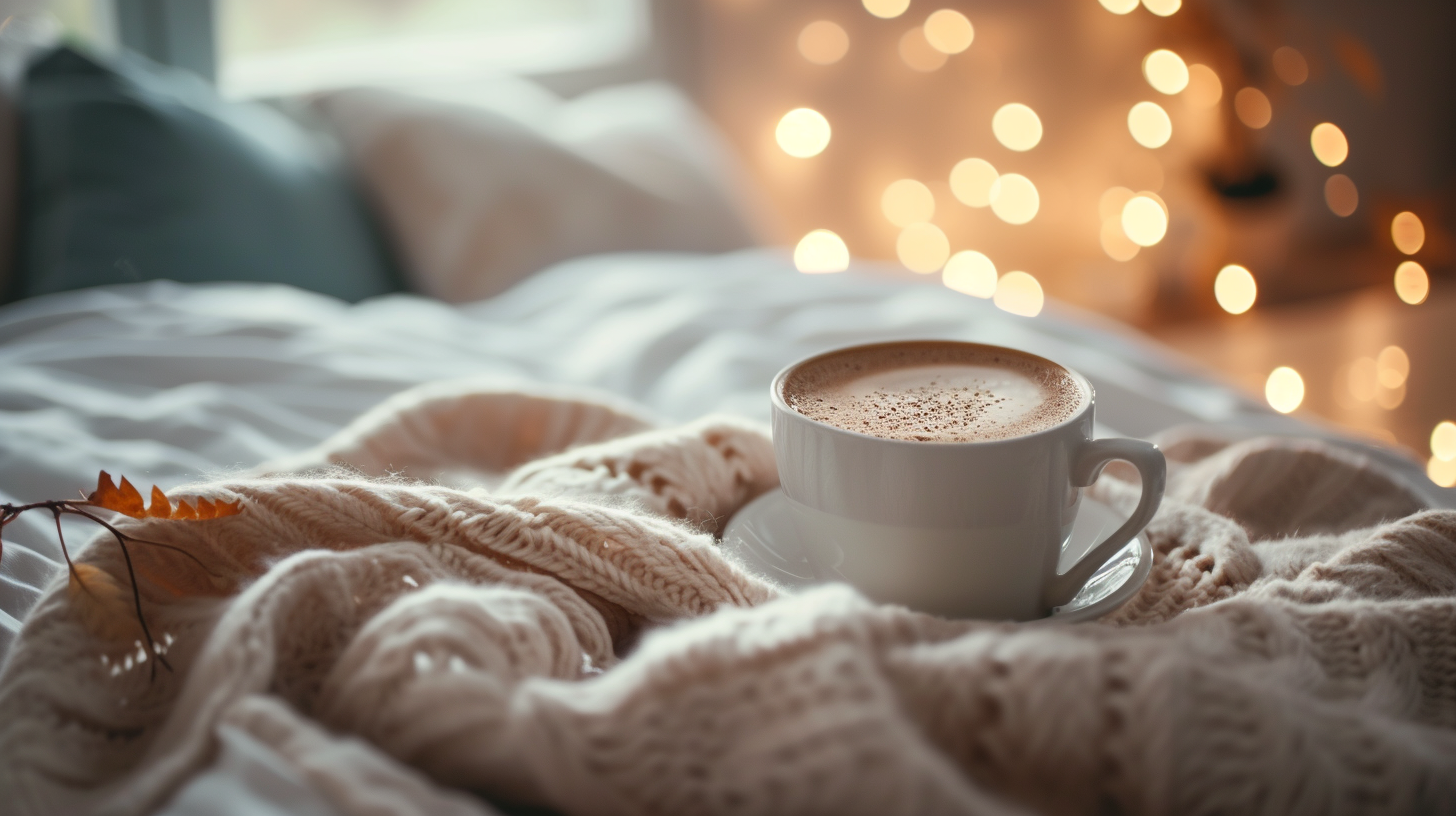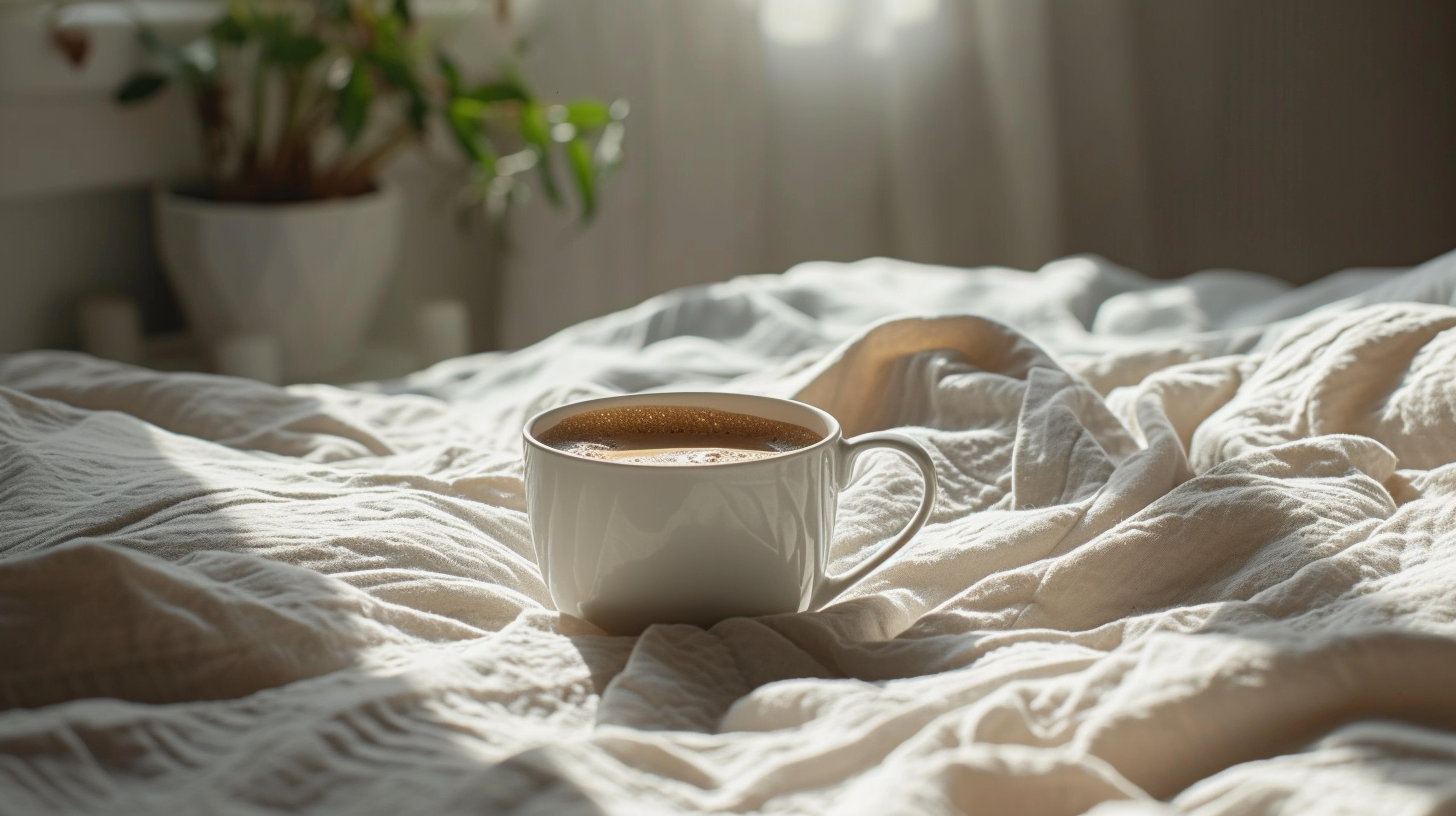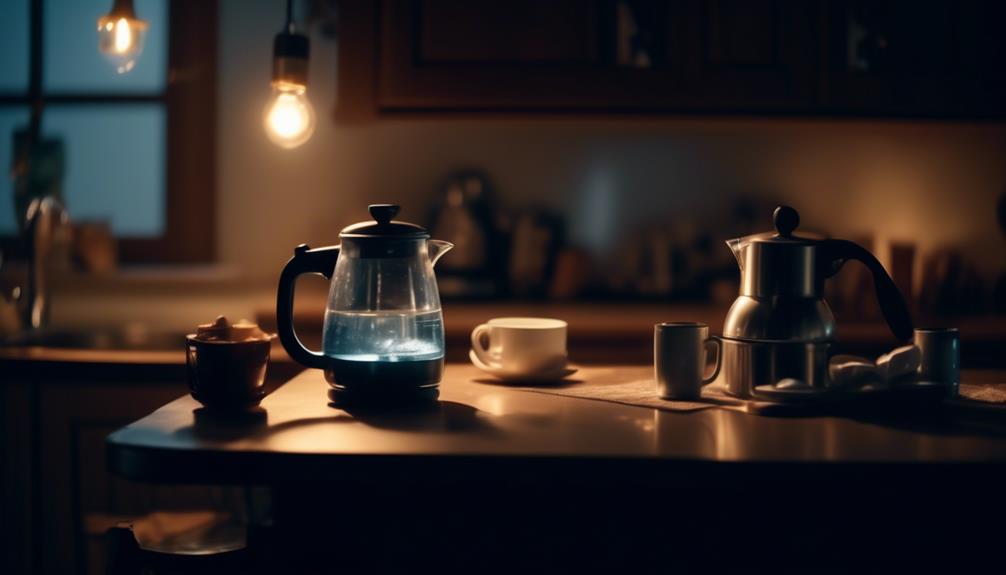Ah, the moon’s out, and like a well-versed vampire, you find yourself thirsting not for blood but for a steaming cup of coffee.
It’s an intriguing conundrum, isn’t it? You’re well aware that indulging in this nocturnal caffeine rendezvous could turn your night into a frustrating bout of sheep counting, yet the craving persists.
This nightly longing for a coffee fix isn’t just a random whim; it’s a complex interplay of psychological triggers, physiological influences, and perhaps even habitual patterns that have stealthily woven themselves into your evening routine.
As we explore the shadowy corners of your nighttime coffee cravings, you might discover that the answer isn’t as straightforward as you’d think, and the solutions might require a closer examination of your daily rituals, stress levels, and even your hydration habits.
Key Takeaways
- Caffeine dependence leads to cravings for coffee at night, even if it disrupts sleep.
- Emotional states and environmental cues can trigger coffee cravings as a form of relief or comfort.
- Physiological effects of caffeine on the body strongly influence late-night coffee cravings.
- Habitual patterns in coffee consumption significantly influence late-night cravings.
Understanding Caffeine Cravings
Often, your body craves caffeine at night due to its dependence on the stimulant to combat fatigue.
These coffee cravings aren’t random; they’re your body’s way of signaling it’s used to the perk you get from your daily cup(s).
The more you drink coffee, the more your body gets accustomed to its effects, leading to increased coffee cravings, especially when you’re feeling tired or sluggish in the evening.
You might find yourself reaching for a cup of coffee at night, even when you know it could disrupt your sleep.
This cycle is a classic sign of caffeine dependence. Your body has learned to associate the feeling of alertness and reduced fatigue with the intake of caffeine.
So, when you’re winding down and should be preparing for sleep, your body sends signals that it’s time to drink coffee instead.
Understanding these caffeine cravings is crucial. It’s not just about enjoying a cup of coffee; it’s about recognizing the body’s response to a lack of stimulants.
When you regularly consume caffeine, your body adjusts its chemical balance, which can lead to a demand for caffeine to maintain alertness and ward off tiredness.
The key to managing coffee at night is recognizing these patterns and understanding that caffeine cravings are a response to what your body has become accustomed to.

Psychological Triggers
Beyond the body’s dependence on caffeine, your cravings can also stem from psychological triggers linked to emotions, environments, and social interactions.
When you crave coffee, it’s not just about the caffeine boost. Often, psychological triggers like stress, reward, or the comfort of routine are at play.
These triggers can activate receptors in your brain that make you feel good, prompting you to reach for that cup of coffee to feel better.
The table below highlights how various psychological triggers can influence your desire for coffee:
| Psychological Trigger | How It Influences Coffee Cravings |
|---|---|
| Emotional states (stress, anxiety) | These emotions can make you seek out coffee as a form of relief or comfort, activating feel-good receptors in your brain. |
| Environmental cues (smell of coffee, seeing a coffee shop) | Such cues can spark a craving by reminding you of the pleasure associated with coffee drinking. |
| Social situations (meeting friends for coffee) | Social interactions can create a strong association with coffee, making you crave it in similar future scenarios. |
| Past experiences (positive memories with coffee) | Positive memories can trigger a craving as you seek to recreate those feel-good moments. |
| Reward or comfort | Associating coffee with a reward or comfort can condition you to crave it in situations where you seek those feelings. |
Physiological Influences

While psychological triggers play a significant role in coffee cravings, it’s the physiological effects of caffeine on your body that can also strongly influence your desire for that late-night cup.
Caffeine in coffee not only boosts your blood pressure and heart rate but also ramps up your physiological arousal.
This sudden surge makes you feel more alert as the caffeine consumption spikes your cortisol levels.
You’re essentially telling your brain it’s time to stay awake, not wind down.
The energy boost from coffee isn’t infinite. Once the caffeine wears off, you might find yourself crashing, feeling even more tired than before.
This rollercoaster effect on your energy levels is a physiological response that can make you reach for another cup, hoping to regain that lost vigor.
Regularly consuming coffee can alter how your body reacts to caffeine. Over time, you might develop a tolerance, meaning you’ll need more coffee to achieve the same alertness.
This altered physiological response can further drive those nighttime cravings as your usual dose doesn’t hit the same way.
Caffeine impacts your sleep patterns by inhibiting the release of melatonin, the hormone that regulates sleep.
Even if your brain craves the health benefits coffee offers, such as its antioxidants and amino acids, messing with your sleep cycle can have detrimental effects.

Habitual Patterns
Habitual patterns in your coffee consumption, such as reaching for a cup every morning, can significantly influence your late-night cravings.
When you consistently indulge in coffee at specific times, your body starts to expect its caffeine fix as part of your daily routine.
This expectation can become so ingrained that you might find yourself craving coffee at night, even when you feel you should be winding down.
Remember, coffee contains caffeine, a stimulant that can disrupt your sleep cycle and leave you feeling like you have little energy the next day.
It’s a cycle that feeds itself: you might drink coffee to gain that burst of energy, but it could be the very thing keeping you from a good night’s sleep.
Your body needs rest to recharge, not caffeine to stay alert when it’s time to go to sleep.
Breaking this cycle involves understanding these habitual patterns and recognizing the role they play in your cravings.
If you’re used to having coffee every morning, try to gradually reduce your intake.
This process allows your body to adjust without the sudden shock of withdrawal. It’s about retraining your body and mind to not depend on caffeine at specific times.
Managing Nighttime Urges

Understanding your habitual patterns is the first step; now let’s focus on how you can effectively manage those nighttime coffee urges.
It’s crucial to recognize that while a cup of coffee, especially iced coffee, might seem like a delightful evening treat, it contains caffeine that can disrupt your sleep.
Here are practical steps to help curb those cravings and ensure you’re getting the rest you need:
Establish a relaxing bedtime routine:
- Reading or taking a warm bath can signal your body it’s time to wind down.
- Ensure your bedroom is dark, quiet, and kept at a comfortable temperature to foster better sleep.
Avoid caffeine at least 6 hours before bed:
- This includes not just coffee but any beverage that contains caffeine.
- Opt for non-caffeinated alternatives if you find yourself craving a warm drink at night. Consider herbal teas or warm milk as they won’t disrupt your sleep.
Practice stress-reducing techniques:
- Meditation or deep breathing exercises before bed can manage stress or anxiety.
- These activities can help relax your mind and body, making it easier to fall asleep without the need for caffeine.
Addressing these urges requires a conscious effort to adjust your habits and environment.
Remember, your sleep is paramount, and ensuring you have at least one relaxing activity before bed can significantly impact your nighttime routine.
Conclusion
In conclusion, your nighttime coffee cravings could be driven by a mix of psychological triggers, physiological influences, and habitual patterns. From the alertness caffeine brings to the comfort of your coffee routine, various factors play a role.
To manage these urges, consider adapting your coffee habits, focusing on healthier consumption and hydration throughout the day. By understanding and addressing the root causes, you can curb these cravings and enjoy a more restful night’s sleep.